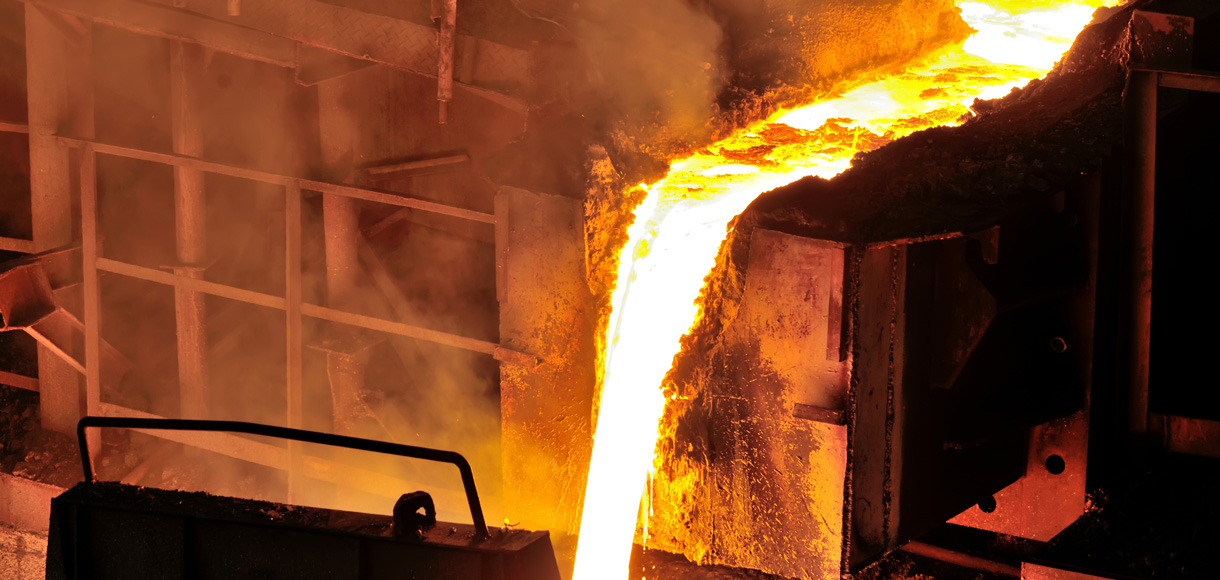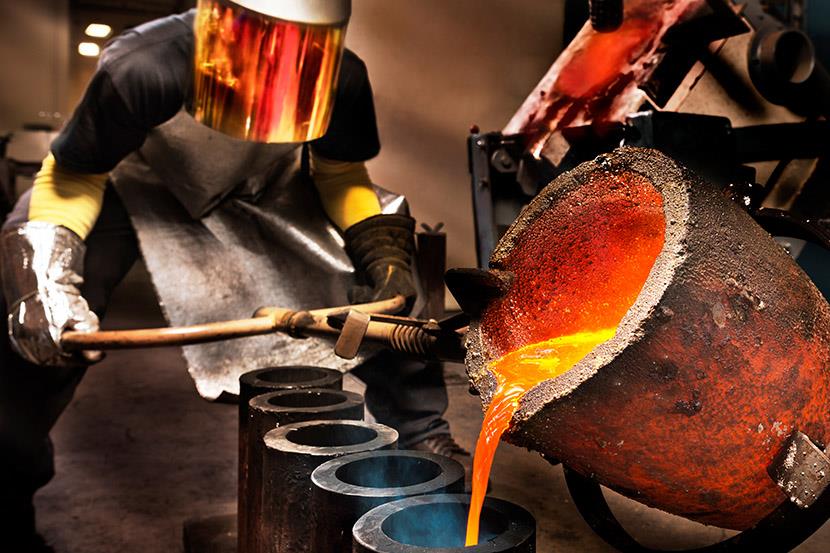How technology and skill shape every Metal Casting outcome
How a Metal Foundry Adds to Lasting Metal Manufacturing Practices
Metal foundries play a necessary role in advertising sustainability within the metal production market. By including recycled products, they lower dependence on virgin sources and reduce environmental effects. Energy-efficient melting procedures additionally decrease energy usage and exhausts. The trip towards lasting practices involves even more than just reusing and energy management. It incorporates a broader commitment to ethical sourcing and cutting-edge modern technologies. The effects of these practices are considerable and warrant closer exam.
The Role of Recycling in Metal Foundries
While metal manufacturing has actually traditionally counted on virgin products, the boosting focus on sustainability has actually caused a significant shift in methods, especially in metal foundries. Recycling has become an important component of this improvement, allowing foundries to repurpose scrap metal and lower dependence on extracted resources. By integrating recycled materials into their processes, foundries not only reduce environmental effect yet likewise lower production expenses.
The usage of recycled steels, such as copper, steel, and light weight aluminum, lessens energy consumption and minimizes greenhouse gas exhausts related to standard mining and refining approaches. Foundries can attain top quality results by utilizing sophisticated sorting and handling technologies to ensure the purity of recycled products. This emphasis on recycling fosters a round economy, where waste is minimized, and sources are made use of effectively. Metal foundries play a crucial role in advertising lasting practices within the metal manufacturing industry.
Energy-Efficient Melting Methods
Energy-efficient melting techniques are important for boosting sustainability in metal production. These techniques considerably decrease power intake throughout the melting procedure, which is just one of the most energy-intensive phases in metal manufacturing. Technologies such as induction melting, resistance home heating, and microwave melting deal enhanced effectiveness compared to standard techniques. Induction melting, for example, makes use of magnetic fields to create heat straight within the metal, decreasing power loss and providing precise temperature level control.
Additionally, applying warm recovery systems can further enhance efficiency by catching and reusing waste heat generated during melting. Using sophisticated insulation products and optimizing heater layouts likewise contribute to energy savings. By embracing these ingenious melting techniques, metal foundries can reduce their carbon footprint, minimize functional costs, and add to a more lasting manufacturing landscape. The combination of energy-efficient methods not only aligns with ecological objectives yet also fulfills the expanding need for liable production methods in the metal industry.
Lasting Sourcing of Raw Products
Lasting sourcing of resources is crucial for lessening the ecological influence of metal production. This includes the increased application of recycled steels, the fostering of moral mining practices, and initiatives targeted at regional sourcing. By prioritizing these techniques, the market can promote accountable source administration and assistance regional economic climates.

Recycled Metal Usage
Just how can sectors successfully minimize their ecological influence while meeting the expanding demand for metal? One considerable technique is the use of recycled metal. By including scrap metal into their manufacturing procedures, foundries can decrease the extraction of virgin products, consequently lowering and conserving all-natural resources power usage. Recycled metals call for less power to procedure contrasted to their raw equivalents, causing lower greenhouse gas emissions. Additionally, using recycled metal aids draw away waste from garbage dumps, advertising a circular economy. Industries that focus on recycled metal not just contribute to sustainability however additionally benefit from cost savings connected with reduced material procurement. Subsequently, recycled metal use stands as a crucial technique for eco responsible metal production.
Ethical Mining Practices
While the need for steels proceeds to climb, sectors are significantly identifying the relevance of moral mining techniques in making certain responsible sourcing of resources. Honest mining includes a dedication to environmental stewardship, social obligation, and adherence to reasonable labor methods. Companies are now prioritizing collaborations with mines that show openness in their operations, minimizing environmental impact and appreciating neighborhood neighborhoods. This method not only cultivates a sustainable supply chain but also boosts the online reputation of organizations included. By carrying out strenuous standards and accreditations, industries can deal with unlawful mining tasks and advertise the well-being of workers. Ultimately, ethical mining practices add noticeably to a much more lasting metal production community, lining up economic development with social and ecological integrity.
Local Sourcing Efforts

Advancements in Metal Casting Processes
Developments in metal casting procedures are changing the market by incorporating innovative recycling techniques that lessen waste. Energy-efficient melting methods are additionally being developed to minimize power usage throughout production. In addition, the usage of ingenious mold and mildew products adds to enhanced performance and sustainability in casting procedures.
Advanced Recycling Techniques
Advanced recycling strategies are changing metal casting processes, substantially enhancing sustainability in the sector. These developments concentrate on reclaiming and recycling scrap metal, significantly decreasing waste and the demand for virgin products. Methods such as hydrometallurgy and pyrometallurgy enable foundries to draw out valuable steels from used parts, making sure efficient source application. Furthermore, advanced sorting and filtration technologies boost the quality of recycled steels, making them suitable for high-performance applications. This not just minimizes the ecological footprint of metal manufacturing but likewise cultivates a circular economy by advertising the reuse of products. As these recycling techniques remain to develop, they promise to additionally streamline procedures within foundries and add to a more sustainable metal production landscape.
Energy-Efficient Melting Techniques
While traditional melting methods have actually long been the foundation of metal casting, recent improvements have actually introduced energy-efficient methods that markedly lower energy usage and discharges. Technologies such as induction melting and electrical arc furnaces have acquired prestige, permitting for exact control over temperature level and reducing the requirement for nonrenewable fuel sources. These approaches not only enhance energy effectiveness yet additionally advertise faster melting times, which translates to reduce functional prices. In addition, innovations in warm healing systems make it possible for foundries to capture and reuse excess warm produced during the melting process. This alternative technique to power administration not only supports sustainable techniques yet additionally placements metal foundries as leaders in the change in the direction of greener production procedures, better lining up with global sustainability goals.
Cutting-edge Mold Materials
As the demand for more sustainable and efficient metal casting procedures grows, the exploration of innovative mold materials has actually ended up being a prime focus in the sector. Standard mold and find here mildew materials frequently add to environmental obstacles, motivating the search for alternatives that reduce waste and power usage. Recent developments include the growth of recyclable compounds and naturally degradable binders, which not only boost mold efficiency yet additionally lessen environmental impact. Furthermore, making use of 3D printing technology in mold and mildew creation permits complex styles that lower material use and enable fast prototyping. These cutting-edge materials not only enhance casting precision but additionally straighten with sustainability goals, showcasing the market's commitment to decreasing its carbon impact while maintaining high-grade manufacturing standards.
Decreasing Waste With Advanced Modern Technology
Innovative technologies are transforming the metal manufacturing sector by greatly decreasing waste and improving performance. Advanced information analytics and equipment learning formulas enable foundries to optimize production procedures, lessening and recognizing inadequacies scrap material. Smart sensors keep an eye on devices performance in real-time, enabling predictive maintenance that minimizes downtime and waste generation. Furthermore, additive manufacturing methods, such as 3D printing, enable the production of facility elements with very little material usage, noticeably decreasing waste compared to typical techniques.
Additionally, closed-loop systems are ending up being extra widespread, where scrap metal and by-products are recycled back right into the manufacturing cycle, guaranteeing that materials are utilized to their fullest capacity - Aluminum Casting. This integration of modern technology not just advertises resource preservation however likewise improves the overall sustainability of metal manufacturing practices. By welcoming these developments, foundries can contribute to a more lasting future while preserving competitiveness on the market
The Effect of Foundries on Carbon Impact Reduction
Foundries play an important function in lowering the carbon footprint of the metal production market by executing numerous sustainable practices. By making use of energy-efficient innovations, such as electrical arc furnaces, these centers significantly lower greenhouse gas exhausts contrasted to typical techniques. Additionally, foundries increasingly take on renewable power sources, which likewise diminishes their reliance on fossil fuels.
Recycling scrap metal is another important practice that foundries employ, conserving sources and minimizing the demand for virgin products. This not just minimizes waste however additionally lowers the energy-intensive removal processes related to mining. The adoption of closed-loop water systems aids to minimize water usage and lower wastewater discharge, contributing to a more sustainable operation.
Through these initiatives, foundries demonstrate their commitment to environmental stewardship, bring about a significant reduction in the overall carbon impact of the metal production sector. Their recurring efforts are essential in the shift towards a more sustainable industrial landscape.
Regularly Asked Inquiries
What Sorts of Metals Are Many Typically Recycled in Foundries?
Aluminum, brass, steel, and copper are amongst the most frequently recycled metals in foundries. These metals are preferred as a result of their high recycling rates, financial value, and extensive schedule, adding substantially to commercial sustainability initiatives.
Just How Do Foundries Make Certain the Top Quality of Recycled Products?
Foundries ascertain the quality of recycled products with extensive screening, arranging, and purification procedures. They carry out sophisticated modern technologies to assess make-up and remove impurities, guaranteeing that the recycled steels satisfy industry requirements for performance and safety and security.
What Certifications Exist for Sustainable Foundry Practices?
Numerous accreditations exist for lasting foundry methods, consisting of ISO 14001 for environmental monitoring, ISO 50001 for energy monitoring, and LEED accreditation for sustainable building methods (Aluminum Foundry). These certifications aid ensure adherence to ecological and sustainability standards in procedures
Exactly How Do Foundries Measure Their Carbon Impact Decrease?
Foundries determine carbon footprint decrease with tools like lifecycle assessments, power audits, and discharges tracking systems. They compare baseline exhausts to existing outputs, assessing renovations in power effectiveness, material usage, and renewable resource fostering gradually.
What Are the Financial Benefits of Lasting Metal Production?
Lasting metal manufacturing offers useful content economic advantages such as reduced operational expenses, raised efficiency, improved market competition, and possible federal government incentives. In addition, it promotes technology and brings in environmentally mindful customers, inevitably driving long-term profitability for companies.
Metal foundries play an essential role in promoting sustainability within the metal manufacturing sector. While metal manufacturing has actually commonly counted on virgin products, the increasing emphasis pop over here on sustainability has led to a considerable change in practices, especially in metal foundries. By incorporating scrap metal into their manufacturing procedures, foundries can lower the removal of virgin products, therefore conserving all-natural resources and reducing power usage. Foundries play a crucial duty in minimizing the carbon impact of the metal manufacturing market by implementing various sustainable practices. Reusing scrap metal is another essential practice that foundries employ, conserving sources and decreasing the demand for virgin materials.